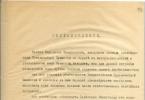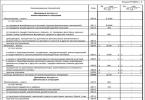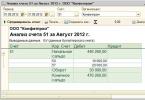For multigrade oil- double number. The first is viscosity at negative temperatures. The second is viscosity at positive temperatures.
Low temperature viscosity indicators:
- 0W - used at temperatures up to −35 degrees. WITH
- 5W - used at temperatures up to −30 degrees. WITH
- 10W - used at temperatures up to −25 degrees. WITH
- 15W - used at temperatures up to −20 degrees. WITH
- 20W - used at temperatures up to −15 degrees. WITH
Much the second one is more interesting the number in the designation is high-temperature viscosity. It cannot be translated as simply as the first one into a language understandable to the car enthusiast, because it is a composite indicator indicating the minimum and maximum viscosity of the oil at operating temperatures of 100-150 ° C. The higher this number, the higher the viscosity of the engine oil at high temperatures. Whether this is good or bad for your engine is something only the car manufacturer knows.
SAE 5W30 or SAE 5W40
What kind of oil was poured into the engine at the factory? What to buy for topping up?
Manufacturing plant Volkswagen brand, fills engines with motor oil whose properties fully comply with the tolerance requirements listed below.
Thus, using data on engine oil tolerances, you can buy any engine oil for topping up.
What kind of engine oil do dealers fill in for maintenance of the Polo sedan?
Dealership in mandatory will suggest replacing with original engine oil. Unfortunately, its cost is not always justified.
To reduce the cost of maintenance, dealers can offer, in addition to the original engine oil, any other oil that meets the tolerances specified above.
This could be Liqui Moly, Gazprom and any other motor oils.
Everything would be fine, the engine is just like an engine, if not for the knocking of the engine when cold. Very many CFNA engines begin to knock before they even reach one hundred thousand kilometers, and in some cases the defect occurs already in the first 30 thousand.
Be careful when purchasing. A common problem is a progressive knocking noise after a cold start.
Engine Polo Sedan CFNA 1.6 l. 105 hp
In due time, exit to Russian market models Polo Sedan costing from 399 tr. (!) became a sensation and was considered an achievement of the Volkswagen concern. Still would! Getting Volkswagen quality for that kind of money is a dream for many. But, as often happens, low price had a bad effect on the quality of the product - Polo Sedan engine CFNA 1.6 l 105 hp turned out to be not as reliable as expected.

Engine CFNA 1.6 was installed not only on the Polo Sedan, but also on other models of the Volkswagen concern, including those assembled abroad. From 2010 to 2015, this engine was installed on following models:
Volkswagen
- Lavida
- Vento
- Polo Sedan
- Jetta
- Fabia
- Roomster
- Rapid
If you don’t know which engine is installed on a given particular car, then you can find out by looking at the car’s VIN code.
CFNA problems
The main problem of the engine CFNA 1.6 is knocking when cold. At first, the knock of the pistons on the cylinder walls manifests itself as a slight tinkling sound in the first minutes after a cold start. As it warms up, the piston expands, pressing against the cylinder walls, so the knocking noise disappears until the next cold start.
At first, the owner may not attach any importance to this, but the knocking progresses and soon even the inattentive car owner realizes that there is something wrong with the engine. The very appearance of a knock (impact of the piston on the cylinder wall) indicates the beginning of the active phase of engine destruction. With the arrival of summer, the knocking may subside, but with the first frost, CFNA will begin to knock again.
Gradually, knock CFNA engine“on cold” increases its duration, and sometimes remains even after the engine warms up.
CFNA: Engine knocking
The knock of the engine piston on the cylinder wall occurs when the pistons are transferred into top dead point. This becomes possible as a result of wear of the pistons and cylinder walls. The graphite coating of the skirts quickly wears down to the piston metal

Significant wear occurs in places where the piston rubs against the cylinder walls.

Then the metal of the piston begins to hit the cylinder wall and then scuffing occurs on the piston skirt

And on the cylinder wall

Despite the large number of complaints, Volkswagen concern over the years of graduation CFNA engine(2010-2015) never declared a recall. Instead of replacing the entire unit, the manufacturer performs repair piston group , and even then only if you apply under warranty.

The Volkswagen group does not disclose the results of its research, but from the scant explanations it follows that cause of defect supposedly consists in poor piston design. In case of a warranty claim, service centers are replacing standard EM pistons with modified ET ones, which supposedly should completely solve problem of piston knocking in cylinders.

But as practice shows, CFNA engine overhaul is not the final solution to the problem and half of the owners again complain about the appearance of engine knocking, after several thousand km. mileage The other half of those who have encountered knocking from this engine try to sell the car as quickly as possible after major repairs.
There is a version that the real reason rapid wear A CFNA engine may suffer from chronic oil starvation caused by low oil pressure. The oil pump does not provide enough pressure when the engine is running at speed idle move, so the motor is regularly in oil starvation, which leads to its accelerated wear.
CFNA engine resource 1.6 liters. 105 hp

Declared by the manufacturer Polo Sedan engine life is 200 thousand km, but traditionally naturally aspirated 1.6 liter engines produced by Volkswagen must travel at least 300-400 thousand km.
A defect such as piston knocking when cold makes these figures irrelevant. The Volkswagen group does not disclose official statistics, but judging by the activity on the forums, 5 out of 10 CFNA engines begin to knock at mileage from 30 to 100 thousand km. There are also known cases of defect manifestation on runs of less than 10 thousand km.
However, it should be noted that there have been no cases of a jammed CFNA motor. This is probably due to the fact that the knocking progresses gradually and gives time to make a decision about repairing the engine or selling the car.
Among the large number of complaints about knocking, there are isolated reports of successful long-term operation an engine that has a knocking noise when cold, which supposedly does not progress and does not bother. Unfortunately, such reports are not confirmed by video recordings and, most likely, it is not the pistons that are knocking, but the hydraulic compensators. According to reviews from car owners whose engines began to knock for real, it soon becomes impossible to ignore this knocking. The ringing becomes so loud that “it’s embarrassing to stand next to the car” and “it can be heard from the 7th floor balcony.”
CFNA Engine Replacement

If the car is under warranty, the manufacturer will provide free warranty repair, replacing standard EM pistons with modified ET ones. The cylinder block and crankshaft can also be replaced, but these expensive parts are not always replaced under warranty.
CFNA timing chain

Engine equipped chain drive timing. The steel chain is designed to eliminate breakage and provide more high reliability compared to belt drive. In addition, the chain should guarantee a service life of at least 150 tkm, but in fact the timing chain of this engine quickly stretches and requires replacement by 100 tkm.
The chain tensioner does not have a backstop and works only due to the oil pressure that is pumped oil pump and occurs only after starting the engine. Thus, the chain tension occurs only when running engine, and while the engine is turned off, the stretched chain can move along with the tensioner.
In this regard, it is not recommended to park the car with the gear engaged, but without locking parking brake. When starting the engine, the stretched chain on the camshaft gears may jump. In this case, it is possible that the valves meet the piston, which leads to expensive repairs engine.
Crack in the exhaust manifold

Over time, during operation, the standard CFNA exhaust manifold cracks and the car begins to growl loudly. Replacement exhaust manifold It is advisable to do it for free, before the end of the warranty, otherwise it will either have to be replaced (for 47 thousand rubles) or welded (as in the photo), which will be cheaper.
CFNA 1.6 l engine: characteristics

Manufacturer: Volkswagen
Years of production: October 2010 – November 2015
Engine CFNA 1.6 l. 105 hp belongs to the series EA 111. It was produced for 5 years, from October 2010 to November 2015, and then was discontinued and replaced by an engine C.W.V.A. from the new generation EA211.
Engine Configuration
In-line, 4 cylinders
2 camshafts Without phase regulators
4 valves/cylinder, Hydraulic compensators
Timing drive: Chain
Cylinder block: Aluminum + Cast iron sleeves
Power: 105 hp(77 kW).
Torque 153 N*m
Compression ratio: 10.5
Bore/Stroke: 76.5/86.9
Aluminum pistons. Piston diameter, taking into account thermal gap for expansion is 76.460 mm
In addition, there is a CFNB version, which is completely identical, but is equipped with different firmware, thanks to which the engine power is reduced to 85 hp.
CFNA oil

Engine oil volume: 3.6 l
Recommended tolerance: VW 502 00, VW 504 00
The oil must comply with 502 approval, or the alternative 504 approval of the Volkswagen concern
The tolerance is indicated on the packaging, and can also be clarified on the oil manufacturer’s website

Recommended oil viscosity: 5W-40, 5W-30.
Filled from the factory 5W-30 Castrol EDGE Professional LongLife III, however, there is an opinion that this brand of oil does NOT provide high engine protection. And certainly, you should not change this oil at intervals of 30 tkm. If you need engine durability, In our country, you need to change the oil every 10 tkm maximum.
What kind of oil to put in a CFNA engine?
Here are several brands of oil that meet VW 502.00 approval
- MOTUL Specific 502 505
- Shell Helix Ultra Extra 5W-30
- LIQUI MOLY Synthoil High Tech 5W-40
- Mobile 1 ESP Formula 5W-30
- ZIC XQ LS 5W30
CFNA engine: reviews

Judging by the reviews of the owners, there have been NO cases of a jammed CFNA motor. The knocking of the pistons, gradually intensifying, causes inconvenience to the owner, but does not lead to sudden engine failure.
The main discussion of the problems of the CFNA 1.6 liter engine. 105 hp is carried out on
The stability and durability of a car engine directly depends on the quality of engine oil. Therefore, you should approach the choice of working fluid very carefully. Let's consider what kind of oil to pour into the Volkswagen Polo sedan engine and what kind oil is flowing on the car from the factory.
Choosing oil for the Volkswagen Polo engine
Technologies do not stand still, and modern manufacturers are ready to offer us widest choice motor oils, each of which has its own performance characteristics and its own characteristics. Selecting oil for specific car, you need to take into account the recommendations of the car manufacturer, seasonality and climate in your area. So what kind of oil should you pour into the Polo sedan engine?
- Volkswagen 501.01; 502.00; 503.00 or 504.00.
Oils are certified and meet the Association’s global quality standard European Manufacturers Cars, SAE viscosity class is 5 w 40 or 5 w 30. The original product is supplied to us directly from Germany.
But it is not at all necessary to pour Volkswagen oil. If you want to evaluate how the composition of another manufacturer will perform, or the nearest stores simply do not have specified oil, you can always choose a suitable analogue. Here are a few simple rules which you need to adhere to when choosing fluid for your engine.
How to choose the right engine oil for a Volkswagen Polo sedan:
- Do not chase low prices and do not purchase cheap options of unknown production and questionable quality.
- Buy oil only in large stores, where there is no risk of running into a low-quality fake.
- Know and adhere to the manufacturer's recommendations.
- Collect information and reviews on oils various manufacturers from more experienced colleagues who have the same car.
For the latter, it is not necessary to call all your friends in search of like-minded people - just look for the “POLOVODOV” communities on Internet resources.
What other oil can be poured into the Volkswagen Polo engine?
Among non-originals, experienced car enthusiasts most often recommend Shell Helix Ultra or Mobil 1. These oils have proven themselves and fully comply with difficult climatic conditions our country, which is why many motorists choose them. Also, the 2014-2016 Volkswagen Polo sedan is filled with Liqui moly Synthoil HighTech or VAG SpecialPlus (both with CAE 5w-40).
Everyone decides for themselves what kind of oil to pour into the Volkswagen Polo engine. It's important to remember that working fluid must be of high quality, have the appropriate characteristics, viscosity and be suitable for those weather conditions, in which the car will be used in the near future.
The history of the brand is strongly connected with the history of the 20th century. If you line up all the company's models, you can see the history of the development of the entire global automotive industry since the 30s of the last century. The company's models have always met market requirements and the preferences of car enthusiasts. The company's name reflects its essence: Volkswagen - the literal translation of the people's car. 21 century-century of technology and numbers. It would seem, what can a company with such a name offer in an era digital technologies? The company found this answer in its past.
The company's first car was called the Volkswagen Typ 1 Käfer. Translated into Russian, Käfer means BEETLE! The requirements for the car were as follows: a small car, but comfortable for 4 people, with maximum speed up to 100 km/h and economical engine. The price of a car is no more than 1000 marks. The created car met these requirements and became a bestseller. No car has ever been in production for as long as the Beetle's 65 years.
2003 was the last year in the history of the model. Who is the receiver? Golf? Polo?
Golf marked the beginning of a whole class of cars; the line of models included both expensive, charged cars and cheap utilitarian ones, but a car was needed that met the requirements laid down in the 30s. It was the POLO model!
Compact car with a decent price. It must be admitted that the model was successful; many Beetle owners switched to this particular model.
From 1975 to 2017, POLO was released in 7 generations. But the most interesting thing happened with the 6th generation. The company decided to adapt this model for countries where preference was given to the sedan body. Russia became one of such countries. The marketers were right; the model became very successful! However, the model began to be called differently Polo Sedan! This model became a full-fledged successor to the ZHUK model! Decent design, beautiful driving performance And unpretentious engines allowed us to stand out as an alternative to the discontinued Zhuk.
Volkswagen cars have General requirements for oils, the same for all models, but different by region. In particular, for countries with unstable fuel quality for gasoline cars It is recommended to use oils with VAG 502 00505 00 approvals.
For long and trouble-free operation of gasoline Volkswagen engines Polo company Liqui Moly GmbH recommends using Leichtlauf High Tech 5W-40 oil with approval 502 00505 00. This modern oil, created on the latest NS-synthetic base and using a high-quality additive package API class SNCF. This oil fully meets the requirements for oils intended for low-grade fuel, namely: it has a high base number, excellent washing and anti-friction properties. The oil provides easy starting frosty weather and provides established international standards fuel economy. Leichtlauf High Tech 5W-40 oil.
You can buy motor oil for Volkswagen Polo Sedan at the official point of sale http://site/map.html
Every car requires attention, care and correct selection elements requiring replacement, including. Everyone knows that almost all motors model range Volkswagens are quite resistant to different modes operation and at the same time quite durable, “Polo” is no exception. But the service life of the power unit directly depends on the lubricant used in the engine. The Polo model was presented to customers in several versions, namely in a hatchback and sedan body. There are also a number of engines that are installed on the Polo, these are 1.2, 1.4, 1.6-liter gasoline and 1.2 and 1.6-liter diesel. On the Polo in a hatchback body you can find all these power units, and the sedan has only a 1.6-liter gasoline engine.

Choosing motor oil for Volkswagen Polo you need to focus on the operating conditions of the car.
Use life of motor oils
Due to the fact that we have two types of engines, we will consider two options for choosing motor lubricants: separately for diesel and gasoline. For diesel power units, it is recommended to change the oil every 70 - 100 thousand kilometers, for gasoline - every 15 - 20 thousand kilometers, in
depending on loads. Accordingly, the greater the load on the engine, the more often the oil should be changed.
Choosing a lubricant for a specific motor
From the factory, the manufacturer uses the original motor lubricant VAG Special Plus, regardless of what fuel the car runs on. The manufacturer recommends the same for topping up. Ideally, if you are concerned about the life of your car's engine, it is recommended to use original product. But if original oil you can’t afford it or because of other beliefs you decided to find an analogue, then when choosing worthy replacement There are several points to pay attention to.

Firstly, the temperature conditions at which the car will be used. If in your place of residence the temperature in winter does not fall below -30 degrees Celsius, and in summer the temperature does not rise above 35, then you can safely choose a lubricant with a viscosity of 5W-40. Temperature conditions important to take into account so that there is no additional problems with starting the engine in cold weather. If the temperature in your region differs from the average, the selection should be made according to the table below.
| № | Viscosity | Lower thermometer reading | Upper thermometer reading |
| 1. | 5W-30 | -35 | +30 |
| 2. | 10W-30 | -25 | +30 |
| 3. | 10W-40 | -25 | +40 |
| 4. | 15W-40 | -20 | +45 |
| 5. | 20W-50 | -15 | +50 |
Secondly, you should decide on the type of oil. If you came across this article, then you want to use any reasonable methods to increase the engine life of your Polo. Therefore, below we will only talk about the lubricant that should be used during replacement. Since we have both diesel and gasoline power units, and some even have a turbocharger, you should only choose synthetic oil. Let's explain why synthetics.
The main advantages of synthetics:
- higher quality of cleaning during production, in contrast to mineral;
- adding various parts that improve the quality of lubrication during operation;
- preventing the formation of sludge deposits in the cylinder-piston group, especially at high mileage;
- easy starting in extreme cold;
- provides at high temperatures.
Choosing the right manufacturer
Today, there are many brands of oils on the petroleum products market for cars. Some of them can be used for Polo as an analogue to the original one. From modern manufacturers You can choose the following models of motor lubricants:
- Total Quartz 9000 5W-40;
- Shell Helix Ultra 5W-40;
- 3000 X1 5W-40.



